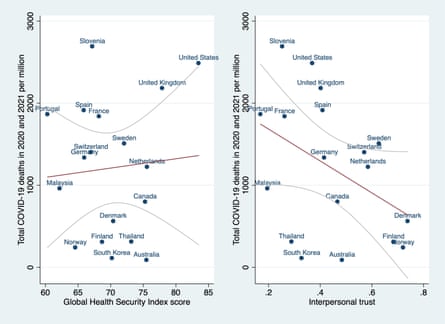In 2019, the Global Health Security Index published a report ranking countries on their preparedness for pandemics. The US scored highest, followed by the UK. Two years later, both countries rank among those with the greatest loss of life from Covid. How could this be?
A large part of the answer is trust. Countries that looked good on paper in 2019, such as the US, UK, Spain and Slovenia, found they lacked this intangible but critical layer of defence. And this figure from our research over the past two years at the Oxford Covid-19 Government Response Tracker shows it in stark terms. On the left (see below) you can see that a higher global health security score in 2019 is not correlated with fewer deaths during the pandemic, at least among the countries whose health systems have a minimum threshold of capacity.

But on the right, we see that a far better predictor of how many people would die – or survive – during the pandemic is the level of interpersonal trust in a society. This doesn’t mean trust in governments or institutions: both have received lots of coverage during the past two years, and yet appear to have little effect. Rather it’s a measure of how much people think they can trust another citizen who they don’t already know.
At every stage in this pandemic, this kind of trust has been a vital resource. After two years we can now see clearly how important it was, raising the question of how we might build it up to deal with both the ongoing threat posed by Covid, and the next pandemic.
Results from the past two years show that the extraordinary measures we were asked to follow to “flatten the curve” really can work to reduce or even eliminate infections, particularly when they are deployed during the beginning of a wave. But dig in a little further, and we see that these restrictions work better – and often don’t have to be as harsh or long – in high-trust countries.
Countries in the top quartile of interpersonal trust actually spent 30% less time with a stringency index over 70 – meaning living with stay-at-home orders, school and workplace closures, and similar restrictions – than those in the bottom quartile. They also saw half as many deaths per capita in 2020 and 2021. In other words, societies in which people trust each other were able to get far more health benefit from looser restrictions.
But interestingly, this effect only holds for interpersonal trust, not for trust in governments. We do not see any difference in the stringency of restrictions applied in countries where citizens trust the government compared to countries where trust in the government is low.
Trust in other people is so important because many aspects of fighting a pandemic require collective action. The only way to break a chain of infection is if everyone takes part, for example by following the rules around social distancing. Individuals are much more likely to change their behaviour if they trust others to do so as well. After all, if you expect others to break the rules, why should you be the sucker still sitting at home?
In addition, trust may be particularly key for light-touch measures such as contact tracing and self-testing, which are likely to remain key elements of a “new normal” in many countries. If you test positive, do you isolate yourself and help identify those you might have put at risk? If you trust others to do the same, you are more likely to do so.
We now know this kind of trust matters immensely. We also know it is in short supply. And, worse, we see evidence that it has fallen during the last two years. The most recent Edelman Global Trust Barometer found sharp declines in overall trust levels in countries such as the US, Germany, Australia and South Korea between 2021 and 2022. These results fit with decades of research showing declining levels of trust in institutions and trust in other people across the globe. These trends are bad news for future preparedness.
But there is hope. One of the most surprising findings in the report is that trust in co-workers and neighbours is up around the world. Many of us can think of anecdotes from the past two years when communities have come together to help each other, particularly during those uncertain first months. People organised food delivery for elderly neighbours and stood at their windows to cheer and clap in support of health workers. Through their response to crisis, people showed they could build trust.
The key lesson is that trust is not like some natural resource buried in the ground that some societies are lucky to have and that others can never get. Trust is something we all, individually and collectively, produce through our actions, behaviours, beliefs and institutions. That means it can be built up.
Governments and policymakers need to ask what can be done to further increase trust. Scholars have identified several key interventions that can promote trust by looking at changing levels of trust in societies across decades: reduce income inequality; fight misinformation on social media; trust people by communicating to them with transparency and honesty.
None of these things are easy, none are panaceas, and none depend on governments alone. But government policies and strategies can make them better– – or worse. The research suggests that governments should take this seriously. Building trust can be just as important as investing in new vaccines or hospital beds. As we aim to build a better immune system for the body politic, long-term investments to build trust will be invaluable.
Thomas Hale is associate professor at the Blavatnik School of Government, University of Oxford, where he leads the Oxford Covid-19 Government Response Tracker. Rodrigo Furst contributed to data analysis for this article

